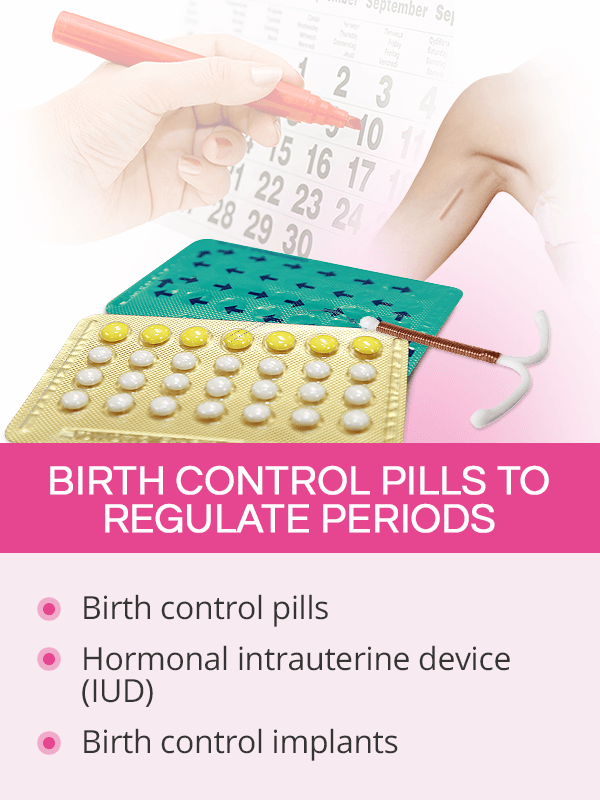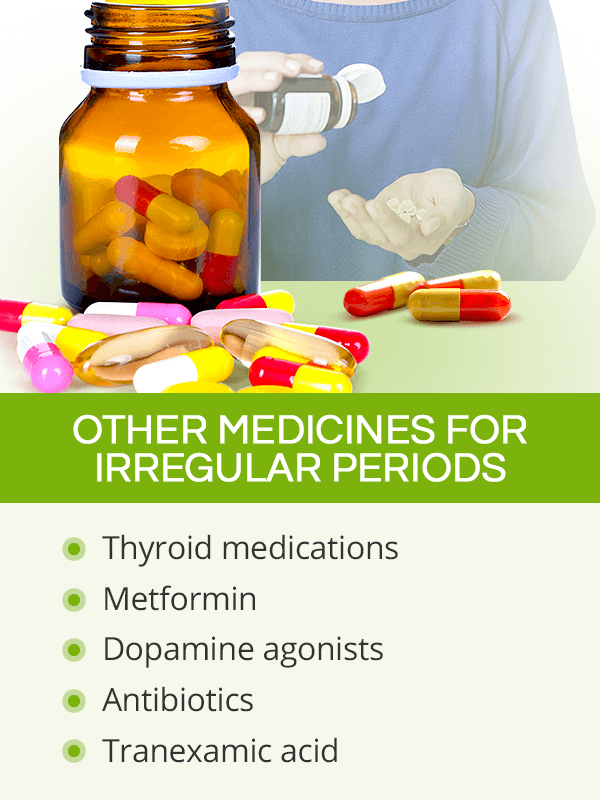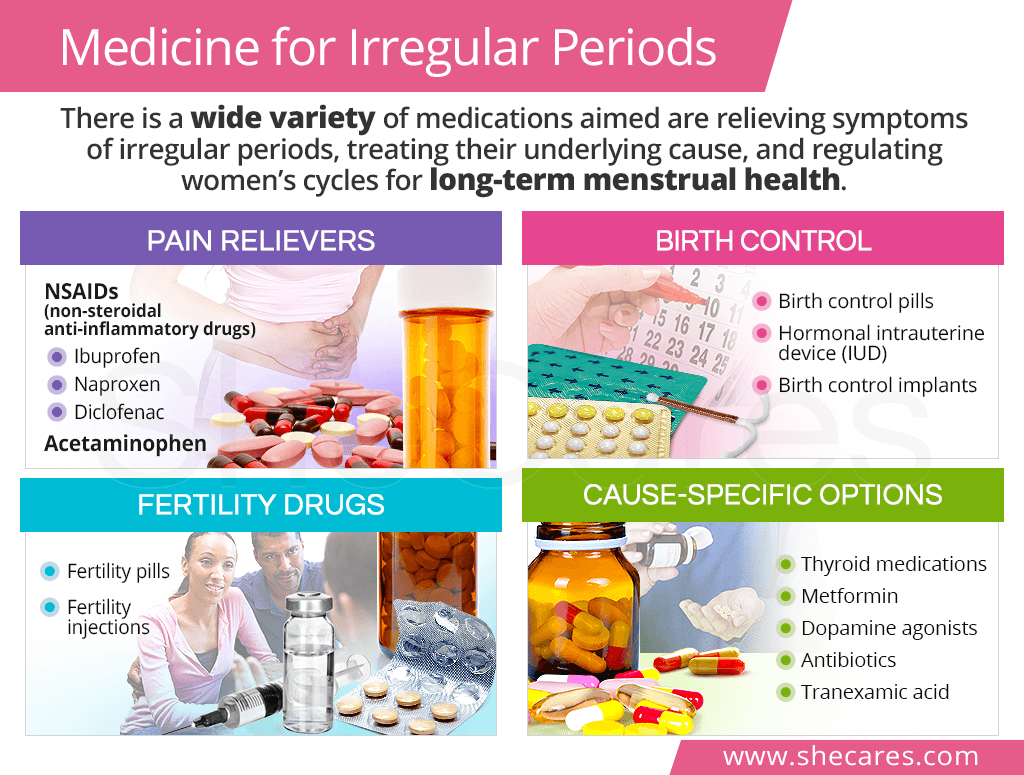Pain-Relieving Pills to Regulate Periods

Painful periods and heavy bleeding can be alleviated with pain relievers, which may be obtained over the counter as well as with a doctor's prescription, depending on their strength.
Analgesic, or pain-relieving, medicine for irregular periods comes in two main types:
Non-steroidal anti-inflammatory drugs (NSAIDs) - such as ibuprofen, naproxen, or diclofenac - reduce menstrual flow and alleviate pain by inhibiting the production of prostaglandins, compounds whose increase during a period is associated with menstrual cramps.
Acetaminophen may be beneficial for reducing low to moderate periods cramps, although its exact mechanism of action is not completely understood.
Birth Control Pills to Regulate Periods

While the main purpose of birth control is - as the name suggests - pregnancy prevention, it is also one of the most commonly prescribed hormonal medicines for irregular periods. It can only be obtained by prescription.
The following are some of the most commonly considered birth control pills to regulate periods:
Birth control pills contain either a low dose of estrogen and progesterone or progesterone alone. They can be beneficial for alleviating anovulation, long cycles, frequent menses, or amenorrhea.
Hormonal intrauterine device (IUD) can also be inserted to relieve heavy or prolonged bleeding.
Birth control implants containing progestin may be useful for reducing dysmenorrhea, or painful periods.
It is important to keep in mind that women who are already taking birth control pills might suffer from irregular periods as a side effect.1 If so, it is important to consult a physician to consider changing the type or dosage.
Fertility Medicine for Irregular Periods

Women planning to get pregnant whose menstrual irregularities concern ovulation problems may be prescribed fertility medications to resolve them and restore their chances of conceiving.
Fertility pills and injections are used to treat absent or irregular ovulation, often as part of infertility treatment.2 They include the following:
Fertility pills - such as clomiphene citrate, letrozole, or metformin - restore ovulation by various modes of action. Some of them are used off-label in women with polycystic ovary syndrome (PCOS), hyperprolactinemia, and other causes.
Fertility injections - human chorionic gonadotropin (hCG) or follicle-stimulating hormone (FSH) - trigger ovulation by encouraging the ovaries to mature eggs.
Other Medicines for Irregular Periods

There are other medications for irregular periods that women may benefit from, depending on their specific cause. By resolving the underlying root, women can achieve healthy ovulation and regular cycles long-term.
These medicines for abnormal periods include, but are not limited to, the following:
Thyroid medications, including radioactive iodine therapy, may be suitable for women whose menstrual abnormalities are due to thyroid disease.
Metformin, which is intended to treat insulin resistance and type 2 diabetes, can also be used to stimulate fertility and regulate cycles.
Dopamine agonists may help regulate periods and restore ovulation in women with PCOS and hyperprolactinemia.
Antibiotics or antifungals might be suitable medicines for irregular periods, particularly intermenstrual bleeding, due to vaginitis or sexually transmitted diseases (STDs).
Tranexamic acid can be used to relieve heavy menstrual bleeding by improving blood clotting, particularly from unknown origins.
Key Takeaways
Menstrual abnormalities have a wide range of manifestations and – luckily - an abundant array of treatment options, including medicines for irregular periods. Women seeking to relieve painful menstrual cramps often manage to ease symptoms with over-the-counter or prescription pain relievers, such as ibuprofen. Those with long or short cycles or absent periods may benefit from low-dose birth control pills or IUDs. Likewise, fertility pills and injections might help women with abnormal or absent ovulation restore their ovulatory cycles and resolve infertility. Finally, other pills to regulate periods may consist of options aimed at treating the underlying cause of abnormalities, such as thyroid or diabetic medications.
Sources
- Eunice Kennedy Shriver National Institute of Child Health and Human Development. (2017). Retrieved April 14, 2020 from https://www.nichd.nih.gov/health/topics/menstruation/conditioninfo/treatments
- Medline. (2017). Medroxyprogesterone. Retrieved April 14, 2020 from https://medlineplus.gov/druginfo/meds/a682470.html
- Middle East Fertility Society Journal. (2016). Differential diagnosis and management of abnormal uterine bleeding due to hyperprolactinemia. Retrieved April 14, 2020 from https://www.sciencedirect.com/science/article/pii/S1110569015300935
- Cleveland Clinic. (2019). Abnormal Menstruation (Periods): Management and Treatment. Retrieved April 14, 2020 from https://my.clevelandclinic.org/health/diseases/14633-abnormal-menstruation-periods/management-and-treatment
- JAMA. (2002). Risks and benefits of estrogen plus progestin in healthy postmenopausal women: principal results from the Women's Health Initiative randomized controlled trial. Retrieved April 14, 2020 from https://www.ncbi.nlm.nih.gov/pubmed/12117397?dopt=Abstract
- NHS. (2018). Heavy Periods Treatment. Retrieved April 14, 2020 from https://www.nhs.uk/conditions/heavy-periods/treatment/
- Office on Women's Health. (2018). Period problems. Retrieved April 14, 2020 from https://www.womenshealth.gov/menstrual-cycle/period-problems
- The Lancet. (2019). Type and timing of menopausal hormone therapy and breast cancer risk: individual participant meta-analysis of the worldwide epidemiological evidence. Retrieved April 14, 2020 from https://www.thelancet.com/journals/lancet/article/PIIS0140-6736(19)31709-X/fulltext
- The Women's. (n.d.). Treatment with medication. Retrieved April 14, 2020 from https://www.thewomens.org.au/health-information/periods/heavy-periods/treating-heavy-bleeding-with-medication
- University of North Carolina. (n.d.). Heavy Prolonged or Irregular Periods. Retrieved April 14, 2020 fromhttps://www.med.unc.edu/obgyn/migs/our-services/what-kinds-of-problems-do-the-doctors-in-this-group-treat/heavy-prolonged-or-irregular-periods/
Footnotes:
- American Family Physician. (2010). Managing Adverse Effects of Hormonal Contraceptives. Retrieved April 14, 2020 from https://www.aafp.org/afp/2010/1215/p1499.html#sec-5
- Fertility and Sterility. (2014). On-label and off-label drug use in the treatment of female infertility. Retrieved April 14, 2020 from https://www.fertstert.org/article/S0015-0282(15)00048-5/pdf
